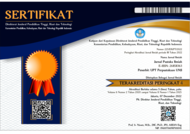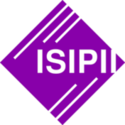Pengaruh Penggunaan Aplikasi TikTok terhadap Literasi Informasi Mahasiswa Jurusan Ilmu Perpustakaan dan Informasi Islam UIN Antasari Banjarmasin
Abstract
Indonesia is the second most active user of the TikTok application in the first quarter of 2022 because it spends an average of 23.1 hours per month on TikTok. The use of time by the user should not be wasted and can produce benefits in the form of information according to the facts. This research uses participatory media culture theory which explains the ways in which new media culture offers audiences to jointly take on the role of media consumers and media producers at the same time. The media in this research is the TikTok application. The research method is a quantitative research method which aims to show the relationship between the influence of the use of the TikTok application as variable This research includes quantitative data collection, analysis, and statistical testing. With a population of 326 people, a sample of 77 people was taken using the Slovin formula. Data was obtained by distributing closed questionnaires using a Likert scale. The results of the research show that there is an influence of the use of the TikTok application on student information literacy, namely 54.0%, meaning that the influence of the independent variable, namely the use of the TikTok application, on student information literacy is 54.0% while the remainder is (100% - 54.0%) is 46% influenced by other variables outside this research. The R-Square value of 54% is included in the moderate category, meaning that the influence of using the TikTok application on student information literacy depends on the individual user's use of the application.
Keywords
Full Text:
PDFReferences
Adawiyah, D.P. (2020). Pengaruh Penggunaan Aplikasi TikTok Terhadap Kepercayaan Diri Remaja di Kabupaten Sampang. Jurnal Komunikasi, 14(2). https://doi.org/10.21107/ilkom.v14i2.7504
Alfiyyah, R. A. (2022). TikTok Jadi Alat Bantu Politisi PDKT dengan Gen Z, Seberapa Besar Peluang Mereka? Query date: 27-01-2024 13:04 WITA https://www.liputan6.com/citizen6/read/5135870/tiktok-jadi-alat-baru-politisi-pdkt-dengan-gen-z-seberapa-besar-peluang-mereka
Castells, M. (2004). Informationalism, Networks, and the Network Society: a Theoretical Blueprint. Edward Elgar.
Celebties.id. (2022). Deretan Negara Pengguna TikTok Terbesar, Indonesia Termasuk? Query date: 17-12-2022 11:05 Wita.
Fauziah, H.T. (2021). Pengaruh Online Shop di Instagram Terhadap Perilaku Konsumtif Siswa SMA Mutiara 1 Jakarta. Jurnal Promedia, 7(1).
Handy, M. & Wijaya, D. (2020). Konsumsi Media Sosial bagi Kalangan Pelajar (Studi Pada Hyperrealitas TikTok. Jurnal Agama Sosisal dan Budaya, 3(2).
Hutajulu, C.S.M. et al. (2022). Peran Aplikasi Tiktok terhadap Minat Belajar Siswa SMA. Jurnal Edukatif: Jurnal Ilmu Pendidikan 4(2). https://doi.org/10.31004/edukatif.v4i2.2546
Jenkins, H. et al. (2006). Confronting The Challenges of Participatory Culture: Media Education for the 21st Century. MIT Press.
Linked in. (2020). Henry Jenkins's Theory of Participatory Culture and Social Media. Query date: 28-12-2022 09:19 Wita. https://www.linkedin.com/pulse/henry-jenkinss-theory-participatory-culture-social-media-
Mahardika, S.V. (2021). Faktor-faktor Penyebab Tinggginya Minat Generasi Post- MillenialIndonesia Terhadap Penggunaan Aplikasi Tik-Tok. SOSEARCH: Social Science Educational Research, 2(1). https://ejournal.unesa.ac.id/index.php/sosearch
Mirna, Riska. (2019). Pengaruh Media Sosial TikTok Terhadap Prestasi Belajar Peserta Didik Di SMPN 1 Gunung Sugih Kab. Lampung Tengah/Mirna Riska. [Sarjana, Fakultas Tarbiyah dan Keguruan, Universitas Islam Negeri Raden Intan Lampung].
Morissan et al. (2010). Teori Komunikasi Massa. Ghalia Indonesia.
Muhajang, Tatang, & Monica D. P. (2018). Pengaruh Literasi Informasi terhadap Efektivitas Belajar Siswa. Pedagonal Jurnal Ilmiah Pendidikan, 2(2).
Mumtaz Z.S.S. (2021). Pengaruh Penggunaan Aplikasi TikTok Sebagai Media Promosi Dan Trend Glow Up Terhadap Minat Beli Produk Kecantikan. Jurnal Manajemen, 13(2). Journal.Feb.Unmul.Ac.Id/Index.Php/Jurnalmanajemen
Nimba, (2012). Apa Itu Sosial Media. Query date: 22-08-2023 08:00 Wita. https://www.unpas.ac.id/apa-itu-sosial-media/.
Nurhidayah, A.A. (2020). Media Sosial dan Tantangan Masa Depan Generasi Milenial. Jurnal Komunikasi Avant Garde, 8(2).
Purnama, R. (2021). Model Perilaku Pencarian Informasi (Analisis Teori Perilaku Pencarian Informasi Menurut David Ellis. Jurnal Pustaka Karya: Jurnal Ilmiah Ilmu Perpustakaan dan Informasi, 9(1). http://dx.doi.org/10.18592/pk.v9i1.5158
Rohmawatin, S. (2018). Budaya Partisipasi (Participatory Culture): Studi Tentang Budaya Partisipasi. Jurnal Komunitas Virtual Penggemar Anime. https://repository.unair.ac.id/72501/3/JURNAL_Fis.IIP.104
Septiyantono, T. (2014). Modul 1 Konsep Dasar Literasi Informasi. http://repository.ut.ac.id/4198/1/PUST4314-M1.pdf)
Storey, J. (2004). Teori Budaya dan Budaya Pop Memetakan Lanskap Konseptual Cultural Studies. Qalam.
Sugiyono, (2011). Metode Kuantitatif, Kualitatif dan R & D. Alfabeta.
Sulistyo-Basuki. (2007). Kemelekan Informasi. Seminar dan Pelatihan Kemelekan Informasi UI Model.
Zulkifli, A. (2021). Pengaruh Sosial Media Tiktok Terhadap Nasib Kebudayaan Nasional. Jurnal Dialektika, Sosial, dan Budaya, 2(2). http://jurnal.staiddimakassar.ac.id/index.php/adrsb
Zurkowski, P.G. (1974). The Information Service Environment Realationship and Priorities. National Commision on Libraries and Information Science.
DOI: https://doi.org/10.20961/jpi.v10i1.75570
Refbacks
- There are currently no refbacks.

This work is licensed under a Creative Commons Attribution-NonCommercial-ShareAlike 4.0 International License.




.png)
.png)









1.jpg)
